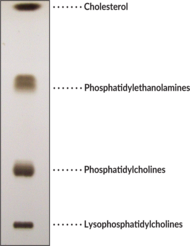Territorial Availability: Available through Bertin Technologies only in France
- Correlated keywords
- Product Overview:
Cholesterol is a major sterol produced in mammalian cells that is required for cell viability and proliferation.{39788} It is a component of mammalian cell membranes that interacts with membrane phospholipids, sphingolipids, and proteins to influence their behavior. Phosphatidylethanolamine is the most abundant phospholipid in prokaryotes and the second most abundant found in the membrane of mammalian, plant, and yeast cells, comprising approximately 25% of total mammalian phospholipids.{24442} Phosphatidylcholine is the most abundant phospholipid in mammalian, plant, and yeast cells.{38744} It is found mainly in the outer leaflet of cell membranes and can make up approximately half of the total phospholipids.{139} In mammalian tissues, phosphatidylcholine commonly contains a saturated and unsaturated fatty acid at the C-1 and C-2 positions of glycerol, respectively. It is a substrate for various enzymes and has a role in cell signaling. Lysophosphatidylcholines are produced by hydrolysis of the fatty acid of phosphatidylcholine.{24384} They have effects on a variety of cell types, including smooth muscle cells, endothelial cells, T lymphocytes, monocytes, and macrophages among others. Lysophosphatidylcholines are a major phospholipid component of oxidized low-density lipoprotein (ox-LDL), and they accumulate in animal models of atherosclerosis. Polar Lipid Mixture contains cholesterol, hydroxy- and non-hydroxy phosphatidylethanolamines, phosphatidylcholines, and lysophosphatidylcholines. It is intended for use as a reference standard for the detection of these polar lipids in various sample types by TLC, LC-, or GC-MS. [Matreya, LLC. Catalog No. 1127]
Cayman Chemical’s mission is to help make research possible by supplying scientists worldwide with the basic research tools necessary for advancing human and animal health. Our utmost commitment to healthcare researchers is to offer the highest quality products with an affordable pricing policy.
Our scientists are experts in the synthesis, purification, and characterization of biochemicals ranging from small drug-like heterocycles to complex biolipids, fatty acids, and many others. We are also highly skilled in all aspects of assay and antibody development, protein expression, crystallization, and structure determination.
Over the past thirty years, Cayman developed a deep knowledge base in lipid biochemistry, including research involving the arachidonic acid cascade, inositol phosphates, and cannabinoids. This knowledge enabled the production of reagents of exceptional quality for cancer, oxidative injury, epigenetics, neuroscience, inflammation, metabolism, and many additional lines of research.
Our organic and analytical chemists specialize in the rapid development of manufacturing processes and analytical methods to carry out clinical and commercial GMP-API production. Pre-clinical drug discovery efforts are currently underway in the areas of bone restoration and repair, muscular dystrophy, oncology, and inflammation. A separate group of Ph.D.-level scientists are dedicated to offering Hit-to-Lead Discovery and Profiling Services for epigenetic targets. Our knowledgeable chemists can be contracted to perform complete sample analysis for analytes measured by the majority of our assays. We also offer a wide range of analytical services using LC-MS/MS, HPLC, GC, and many other techniques.
Accreditations
ISO/IEC 17025:2005
ISO Guide 34:2009
Cayman is a leader in the field of emerging drugs of abuse, providing high-purity Schedule I-V Controlled Substances to federally-licensed laboratories and qualified academic research institutions for forensic analyses. We are certified by ACLASS Accreditation Services with dual accreditation to ISO/IEC 17025:2005 and ISO Guide 34:2009.

